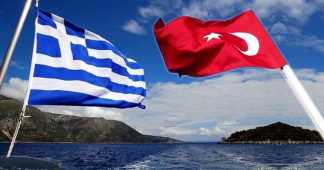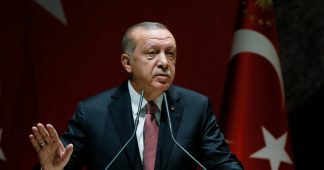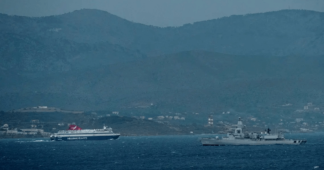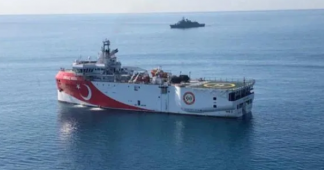War of words escalates between Athens and Ankara, as Erdoğan issues threats.
By Nektaria Stamouli
September 7, 2022
Greece says that Europe risks another Ukraine situation if it doesn’t put an end to Turkey’s inflammatory rhetoric toward Athens.
Earlier this week, the Greek foreign ministry sent letters to NATO, the United Nations and the EU complaining about comments by Turkish President Recep Tayyip Erdoğan that it said were “unprovoked, unacceptable and an insult against Greece and the Greek people” and asking the organizations to condemn Ankara’s behavior.
“By not doing so in time or by underestimating the seriousness of the matter, we risk witnessing again a situation similar to that currently unfolding in some other part of our Continent,” Greek Foreign Minister Nikos Dendias wrote in the letters, dated Monday and Tuesday, alluding to the ongoing Russian invasion of Ukraine.
Erdoğan has stepped up his rhetoric against Greece in recent days, amid what Ankara sees as a growing military buildup on the Greek Aegean islands, close to Turkey’s coastline. In a repeated, thinly veiled threat, he said: “We can come down suddenly one night when the time comes.”
“They have islands in their possession, they have bases on these islands; if illegitimate threats against us continue based on them, our patience has a limit,” he said Tuesday during a visit to Bosnia and Herzegovina.
Greece slammed Erdoğan’s remarks as “openly threatening” in nature and tone.
“The Turkish attitude is a destabilizing factor for NATO’s unity and cohesion, weakening the southern flank of the Alliance at a moment of crisis,” Dendias said, adding that Greece is “currently witnessing one of their worst periods for years.”
Dendias stressed that the “openly threatening nature and tone are more than obvious, thus dispelling any doubts as to their intended purpose, as well as any allegations that they are only meant for domestic reasons in view of the next elections in the country.”
Despite being NATO allies, the neighboring countries have been at odds for decades over a number of bilateral disputes, including maritime boundaries, overlapping claims to their continental shelves and the long-running Cyprus dispute.
Much to the Turks’ ire, Greece granted the U.S. military open-ended access to key bases in an update of their mutual defense cooperation agreement in October 2021. Erdoğan cut off all bilateral talks with Greece last May after Greek Prime Minister Kyriakos Mitsotakis urged U.S. lawmakers to block arms sales to Turkey. Military provocations increased soon after, creating the most volatile situation since the two sides almost came to blows in 2020 over Turkey conducting energy exploration in waters claimed by Greece.
On Monday, the EU expressed its concerns over Erdoğan’s comments, while the U.S. State Department called them “unhelpful” and repeated that Greek sovereignty over the Aegean islands is “not in question.”
Ankara also sent letters to the EU, NATO and the U.N. on September 1, accusing Greece of engaging in “unlawful actions” and making “maximalist demands” in the Aegean.
We remind our readers that publication of articles on our site does not mean that we agree with what is written. Our policy is to publish anything which we consider of interest, so as to assist our readers in forming their opinions. Sometimes we even publish articles with which we totally disagree, since we believe it is important for our readers to be informed on as wide a spectrum of views as possible.











